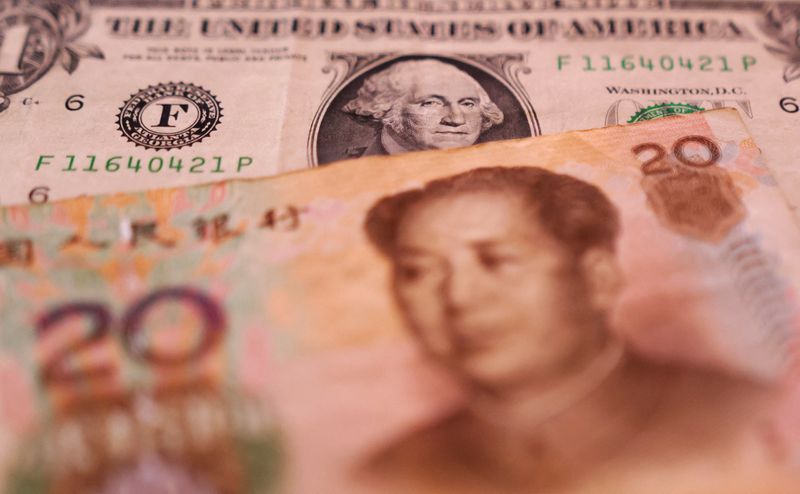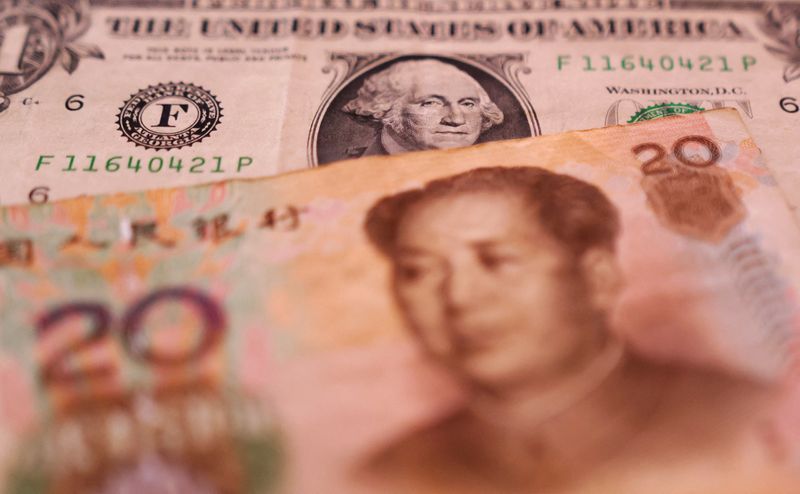
By Stefano Rebaudo
(Reuters) – The dollar eased slightly against a basket of currencies on Monday while dropping versus the yen as investors focused on U.S. President Joe Biden’s decision to end his re-election campaign and the next moves from the Federal Reserve and the Bank of Japan.
Biden announced he was exiting the race on Sunday, and endorsed Vice President Kamala Harris to replace him as the Democratic candidate in the November election.
Harris quickly received the backing of many within the party, but several high profile names stayed quiet, including former House of Representatives Speaker Nancy Pelosi.
Former President Trump, the Republican nominee, sits well ahead in betting markets.
The dollar index – a measure of its value relative to a basket of foreign currencies – fell 0.1% at 104.30.
“There is a growing consensus that the dollar will be stronger if Trump wins due to tax cuts and tariffs, but it’s more complicated than that as Trump doesn’t want a strong dollar,” said Athanasios Vamvakidis, head of global forex research at BofA.
“What happened in the last few weeks taught us we shouldn’t expect the dollar to react to election developments unless the candidates make specific reference to the U.S. currency,” he added. “I expect the market to continue trading on the back of the data and central banks.”
Some analysts argued it was too early to assess the impact of Biden’s move as markets await election polls in the next few days and weeks, but also that the dollar was bound to remain strong no matter who wins the presidential elections.
“For this (verbal jawboning to weaken the dollar) to be effective it has to be accompanied by financial market intervention that is very large, capital controls that would be exceptionally costly or the erosion of Fed independence,” said George Saravelos, global head of forex at Deutsche Bank.
“We conclude that tariffs and their associated stronger implications for the USD are significantly more likely to be the dominant market outcome compared to the alternative of a major shift in dollar policy,” he added.
Some analysts argued the Japanese currency could be at a turning point after falling since the beginning of 2024 as the Fed is close to cutting rates and the BoJ is widely expected to tighten its monetary policy soon.
The Federal Reserve Open Market Committee will meet on July 30, a day before the Bank of Japan.
Money markets fully price in a 25 bps Fed rate cut by September.
Lee Hardman, senior currency analyst at MUFG, said the yen has been supported by “more compelling evidence of slowing U.S. inflation.”
The greenback dropped 0.6% versus the Japanese currency at 156.58.
“From now on, I expect the dollar to struggle to rise above 160 versus the yen, but I don’t see a reversal of the current trend,” BofA Vamvakidis argued.
The euro was up 0.05% at $1.088.
Analysts flagged that the ECB offered no concerted push back at last week’s policy meeting on the heavy pricing for a cut in September, which remains a strong base case.

The dollar strengthened 0.1% to 7.2943 yuan in offshore trading after the People’s Bank of China unexpectedly cut the seven-day reverse repo rate to 1.7% from 1.8%, saying the move would improve open market operations and support the real economy. That was followed minutes later by surprise reductions to the one- and five-year loan prime rates.
The Australian dollar sagged 0.30% to $0.6659, giving up earlier gains of about the same margin following news of Biden’s withdrawal.
This post is originally published on INVESTING.


